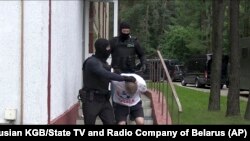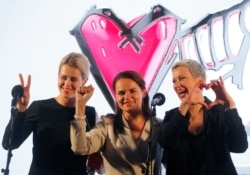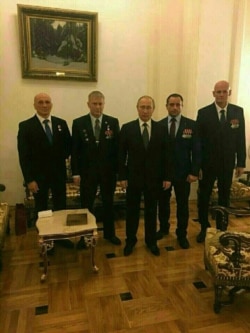On Aug. 4, Belarus leader Aleksandr Lukashenko delivered his annual address to the nation and its parliament, the same day polling stations opened for early voting in the presidential election set for Aug. 9.
The 65-year-old Lukashenko has been president of the country for 26 years. Prior to the voting, he arrested or forced into exile and barred from the ballot his top male political contenders. He now faces competition from three women, led most prominently by Svetlana Tikhanovskaya, 37, who is drawing crowds of thousands while calling out Lukashenko as a “dictator.” Tikhanovskaya’s husband was one of the candidates arrested and forced out.
In much of his Aug. 4 address, Lukashenko spoke about the country’s security. He argued that Belarus' existence as an independent state is threatened by “manufactured candidates” (i.e., his opponents) who are the “plywood puppets” of outside powers and “appear out of nowhere, deceive, stage provocations, then sign out back to their masters.”
Lukashenko’s campaign has focused on alleged threats from outsiders, especially after July 25, when Belarusian security forces arrested 33 men identified as mercenaries from the Russian security firm PMC Wagner. Citing law enforcement sources, the Belarusian state news agency Belta.by reported that the group was part of a larger deployment of around 200 “well trained militants, sent to destabilize the situation in Belarus during the election campaign.”
The agency published a video of the arrests and the personal data of the purported Wagner mercenaries.
The arrests quickly prompted contradictory theories in media and social networks about what really happened and why. During his Aug. 4 address, Lukashenko dismissed all the explanations other than the government’s as baseless conspiracy theories.
“These people (they have confessed) were sent specifically to Belarus,” he said. “Their orders were to wait.”
The statement is misleading.
Considerable evidence suggests a less-sinister explanation for the arrests. And with the ongoing vote, it suits Lukashenko to appeal to patriotism by spinning the notion that Belarus is under siege.
The mercenary group, according to officials cited by Belta.by, arrived in the capital Minsk on July 24, and stayed in a hotel for two nights before moving into a sanatorium on the outskirts of the city.
After the arrests, the head of Belarus’ security agency accused Russia of interference and claimed the militants were sent to stage “terror attacks” during the election. Lukashenko demanded an explanation from the Kremlin, but the Russian presidential spokesman Dmitry Peskov dismissed the allegations as “nothing but insinuations.”
Wagner is a shadowy military and security company, affiliated with Vladimir Putin’s close confidant, financier Yevgeny Prigozhin.
The United States regards Wagner as a proxy for the Russian military and has sanctioned Prigozhin for Wagner activities that threatened civilians. Prigozhin also was sanctioned, for his role in alleged Russian interference in the 2016 U.S. presidential elections.
Despite Russian denials, multiple sources independently confirmed the identities and Wagner affiliation of the men on the Belta.by list.
Ukraine’s security agency said it had identified at least four of the men as having fought in the Donbas region along the Russian border against Ukraine government forces. Ukraine said it would seek their extradition to be investigated and tried.
Zakhar Prilepin, a popular Russian novelist who holds far-right views and fought against Ukraine in Donbas in 2017-2018, wrote via Telegram that “there really are a few former fighters from our battalion” among those arrested in Minsk.
The independent Russian newspaper Novaya Gazeta, one of the most authoritative sources on Wagner, published detailed dossiers on 16 of the men, including copies of their Russian passports, contracts with Wagner and locations of their deployments.
Although the Belarusian authorities claim the men “confessed,” they did not release other evidence concerning the men’s motives or specific terrorist plans.
Meanwhile, observers have floated other possible explanations for the mercenaries’ arrival in Belarus.
The leading explanation is that Belarus was never the mercenaries’ target or final destination, but simply a stopover. The theory was pushed by the Telegram channel War Gonzo, which some say has ties to Russian military intelligence.
Citing anonymous Russian intelligence sources, War Gonzo’s Semyon Pegov, a former war correspondent for the Russian tabloid Life, said Wagner “has long been using Minsk as a transit hub” for mercenaries deployed “predominantly to Africa.”
Pegov asserted that the Belarusian security apparatus was on board and provided logistical support to the mercenaries with Lukashenko’s knowledge and approval.
Kremlin spokesman Dmitry Peskov said the arrested men only stayed in Minsk because they were late for a flight to Istanbul.
Lukashenko said the Istanbul tickets were part of the group’s cover story to conceal the fact that Belarus was the intended destination. Some news accounts in Ukraine and Russia also disputed the transit hub theory.
Another theory is that Lukashenko plotted with Russian President Vladimir Putin to use the destabilization threat as a way to discredit the opposition and possibly remove his most popular opponent, Svetlana Tikhanovskaya, right before the election.
Lukashenko denied those allegations. However, Belarusian investigators already have charged Tikhanovskaya’s husband with conspiring with the Russian mercenaries to launch nationwide “disturbances” during the campaign. Sergei Tikhanovsky, a popular YouTube blogger, was removed from the race and jailed in May on what Lukashenko said was his personal orders.
Tikhanovskaya remains on the ballot, but the regime has reportedly increased pressure against the opposition, arresting dozens during peaceful rallies.
Lukashenko has a history of playing Russia as both friend and foil.
In February 2019, Putin invited Lukashenko for three days of talks at the Russian presidential residence in Sochi, on the Black Sea. The reported goal of the meeting was to reach a deal on integrating neighboring Belarus into Russia, but no such integration was ever announced.
Some Belarus watchers said the deployment of Wagner to Minsk could be a message from Putin to Lukashenko signaling that without the former’s support, Russia could become a dangerous adversary.
Putin and Lukashenko discussed the arrests over the phone on Friday. "The two leaders agreed to determine why the Russians were arrested, find the people responsible and bring them to justice," Reuters reported, citing Lukashenko's press office.








